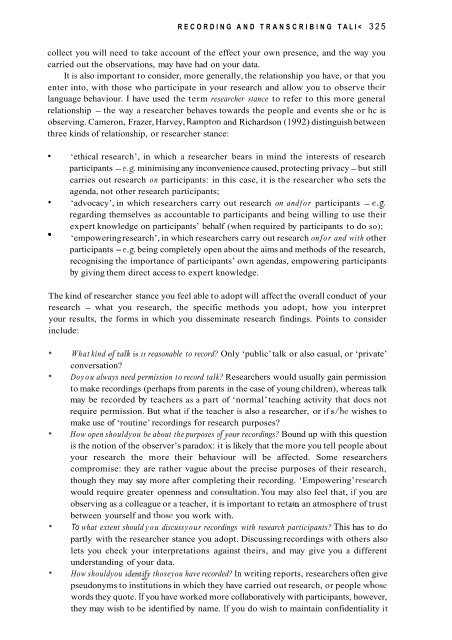English Language Teaching in its Social Context
English Language Teaching in its Social Context
English Language Teaching in its Social Context
Create successful ePaper yourself
Turn your PDF publications into a flip-book with our unique Google optimized e-Paper software.
RECORDING AND TRANSCRIBING TALI< 325collect you will need to take account of the effect your own presence, and the way youcarried out the observations, may have had on your data.It is also important to consider, more generally, the relationship you have, or that youenter <strong>in</strong>to, with those who participate <strong>in</strong> your research and allow you to observe thcirlanguage behaviour. I have used the term researcher stance to refer to this more generalrelationship - the way a researcher behaves towards the people and events she or hc isobserv<strong>in</strong>g. Cameron, Frazer, Harvey, Rampton and Richardson (1 992) dist<strong>in</strong>guish betweenthree k<strong>in</strong>ds of relationship, or researcher stance:‘ethical research’, <strong>in</strong> which a researcher bears <strong>in</strong> m<strong>in</strong>d the <strong>in</strong>terests of researchparticipants - e.g. m<strong>in</strong>imis<strong>in</strong>g any <strong>in</strong>convenience caused, protect<strong>in</strong>g privacy - but stillcarries out research on participants: <strong>in</strong> this case, it is the researcher who sets theagenda, not other research participants;‘advocacy’, <strong>in</strong> which researchers carry out research on and for participants - e.g.regard<strong>in</strong>g themselves as accountable to participants and be<strong>in</strong>g will<strong>in</strong>g to use theirexpert knowledge on participants’ behalf (when required by participants to do so);‘empower<strong>in</strong>g research’, <strong>in</strong> which researchers carry out research on, for and with otherparticipants - e.g. be<strong>in</strong>g completely open about the aims and methods of the research,recognis<strong>in</strong>g the importance of participants’ own agendas, empower<strong>in</strong>g participantsby giv<strong>in</strong>g them direct access to expert knowledge.The k<strong>in</strong>d of researcher stance you feel able to adopt will affect the overall conduct of yourresearch - what you research, the specific methods you adopt, how you <strong>in</strong>terpretyour results, the forms <strong>in</strong> which you dissem<strong>in</strong>ate research f<strong>in</strong>d<strong>in</strong>gs. Po<strong>in</strong>ts to consider<strong>in</strong>clude:What k<strong>in</strong>d oftalk is it reasonable to record? Only ‘public’ talk or also casual, or ‘private’conversation?Do you always need permission to record talk? Researchers would usually ga<strong>in</strong> permissionto make record<strong>in</strong>gs (perhaps from parents <strong>in</strong> the case of young children), whereas talkmay be recorded by teachers as a part of ‘normal’ teach<strong>in</strong>g activity that docs notrequire permission. But what if the teacher is also a researcher, or if s/he wishes tomake use of ‘rout<strong>in</strong>e’ record<strong>in</strong>gs for research purposes?How open shouldyou be about the purposes $your record<strong>in</strong>gs? Bound up with this questionis the notion of the observer’s paradox: it is likely that the more you tell people aboutyour research the more their behaviour will be affected. Some researcherscompromise: they are rather vague about the precise purposes of their research,though they may say more after complet<strong>in</strong>g their record<strong>in</strong>g. ‘Empower<strong>in</strong>g’ rescarchwould require greater openness and consultation.You may also feel that, if you areobserv<strong>in</strong>g as a colleague or a teacher, it is important to rcta<strong>in</strong> an atmosphere of trustbetween yourself and thosc you work with.To what extent should you discuss your record<strong>in</strong>gs with research participants? This has to dopartly with the researcher stance you adopt. Discuss<strong>in</strong>g record<strong>in</strong>gs with others alsolets you check your <strong>in</strong>terpretations aga<strong>in</strong>st theirs, and may give you a differentunderstand<strong>in</strong>g of your data.How shouldyou identfy thoseyou have recorded? In writ<strong>in</strong>g reports, researchers often givepseudonyms to <strong>in</strong>stitutions <strong>in</strong> which they have carried out research, or people whoscwords they quote. If you have worked more collaboratively with participants, however,they may wish to be identified by name. If you do wish to ma<strong>in</strong>ta<strong>in</strong> confidentiality it












